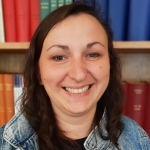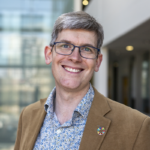As part of our Poverty in Data Impact event we’re welcoming back some of our previous Data Impact Fellows to take part in a panel about being an Early Careers Researcher (ECR). This panel is part of our ECR workshop which is taking place on Tuesday 23 April in Manchester. There’s still a few places left on this event, registration closes at midnight on Wednesday 17 April! You can register here.
To set the scene a little we wanted to introduce the participants of this Q&A panel and asked a couple of them: “What is the most challenging aspect of being an ECR?”.
Ben Brindle

Ben is a Researcher at the University of Oxford’s Migration Observatory, which informs public and policy debates by providing impartial, evidence-based analysis of data on migration and migrants in the UK. He authors and co-authors briefings covering a range of topics – including UK migration statistics, migrant workers, and the impact of changes to UK visa rules – and is currently designing a large-scale panel survey with researchers at UCL and KCL that will examine how Hong Kongers with BNO status have integrated into UK economy and society. Impact is a key part of Ben’s work. He prepares responses to journalists’ enquiries and has been interviewed on broadcast media, including by the BBC News Channel, LBC, and BBC Radio 5 Live.
Here’s Ben’s thoughts on what makes being an ECR challenging:
Life in academia has its perks. I get to spend my days researching and writing about a topic that is both fascinating and important – but building a profile in research, all while staying on top of the day job, can be a challenge.
Only now am I realising quite how much time needs to be spent on funding applications. It’s not just the time spent writing proposals, including trying to work out what I’m meant to say in two boxes with almost identical wording, but all the stuff that comes before. Searching for funding opportunities, thinking of ideas, discussing them with colleagues. It takes longer to apply for research than to actually do the research!
On top of that is networking. It’s great fun and a big part of building a reputation, but it’s also time consuming. I’ve lost count of the hours I’ve spent on trains, and as much as I tell myself they’re a good spot to do some work, the Wi-Fi is never as good as promised. That’s if you’re not packed into the walkway.
None of this is helped by policymakers, who seemingly have no consideration for these things when they announce new migration policies. The minute a new threshold, ban, or exemption is announced, all attention must turn to writing a new commentary and answering journalists’ questions about what the changes mean. Won’t somebody think of the early career researchers?!
How to spin all of these plates while avoiding the late nights? Thinking ahead is key. I keep an eye on the release dates for statistics and reports, since these are likely to be busy days, and make sure I know my event schedule – even if I can’t do the big jobs on the train, it’s a good time to read that paper I’ve been telling myself I would look at. You can hold me to that too: ask me how much reading I got done on the train to Manchester!
Bozena Wielgoszewska

Bozena is a Research Fellow at the Social Research Institute, University College London, where she works across two centres: the Centre for Longitudinal Studies (CLS) and Quantitative Social Science (QSS). Within the CLS, she leads two research themes: ‘Inequality, Poverty, and Social Mobility’ and ‘Labour Market and Skills.’ Bozena has previously contributed to projects such as the COVID-19 Longitudinal Health and Wellbeing National Core Study, where she was involved in generating new, data-driven insights into the Covid-19 furlough scheme. She also played a key role in the harmonisation of income and earnings data across cohort studies and was involved in a project examining the language used in essays written by participants of the National Child Development Study at age 11, shedding light on their future social mobility. In her role at the QSS, Bozena works on a project investigating the gender wage gap over the life course and across cohorts.
Bozena shares her thoughts on the challenges facing ECRs:
Being an early career researcher is a very individual journey and it is hard to think of challenges that are universally applicable. Managing the multiple, proverbial ‘hats’ is certainly in my top three.
The role of PhD student is usually clearly defined, but most PhD students don’t have a permanent job guaranteed upon completion of their thesis and the opportunities that come up are very circumstantial.
This means you have to be flexible and often change your ‘hat’, so that you can develop a coherent portfolio of work, while making the most of opportunities available, even if they do not neatly align with what you would like to research in the perfect world.
There is also the ‘long-term hat’ and the ‘short term hat’ – there may be funding opportunities that require you to plan for a few years ahead. At the same time, you may not know where your next paycheck is coming from.
There is the ‘leadership hat’ and the ‘supporter hat’ – sometimes you take a lead role on papers or projects, and you make executive decisions that may contradict someone else’s views. Other times, your role is to support someone else, even if their views contradict yours.
You need to find a way to be proud of your successes, while swiftly moving on from rejections; to lecture without preaching; to compete without letting it impede your collaborations.
The good news is that, with practice, one day you find yourself with a wardrobe full of `hats` and whatever comes your way, you will already have a `hat` for that.
Rachel Oldroyd

Rachel is a Lecturer in Spatial Data Science based within the Institute for Spatial Data Science, and a Research Fellow within the Consumer Data Research Centre, both at the University of Leeds. She completed her PhD in Big Data and Food Safety in 2021, a case partner project with the Food Standards Agency which combined novel data sources to identify populations at risk; construct spatial-temporal models of food safety at varying geographies; and explore the utility of these models as a means to target scarce Local Authority resources. Since completing her PhD, Rachel’s research interests have centred around food access, safety and insecurity, and health geography more broadly. Recent projects include the Priority Places for Food Index, a composite index created in collaboration with the consumer group Which? to identify neighbourhoods in the UK most at risk of food insecurity. Rachel has extensive experience working with external organisations such as the Food Foundation, online food delivery platforms, food redistribution charities and local councils to co-design effective research and outputs. Rachel is also heavily involved in the teaching of spatial data science in the School of Geography and across the University.
Christian Reynolds

Christian Reynolds is a Reader in Food Policy at the Centre for Food Policy, City University, London; and is the Senior Tutor for Research at the Centre for Food Policy. Christian is the City, University of London lead for the UK Food Systems Centre for Doctoral Training (UKFS-CDT) (joint with Dr Rebecca Wells).
Christian is recognised as a global expert on food loss and waste and sustainable diets. He has worked on these issues in Australia, New Zealand, Indonesia, the UK, US, and Europe. He is the lead editor of the Routledge Handbook of Food Waste; he has also co-authored over 50 peer reviewed publications, as well as multiple reports and book chapters. Christian has given evidence to UK and NZ parliaments on FLW and contributed to the Food Loss and Waste Accounting and Reporting Standard. In 2022 Christian led and supported rapid reviews of evidence for the Food Standards Agency and Defra on topics including citizen science; sustainability in the UK food system; and the environmental impact of public procurement. Christian also researches sustainable cookery; food history; and the political power of food in international relations.
Service Director for Impact for the UK Data Service, Finn Dymond-Green says
I’m really looking forward to hearing from some of our earlier Data Impact Fellows about how their career journeys have been progressing, the challenges they’ve encountered and the successes they’ve enjoyed. I’m sure they will have lots of insight to share with participants early in their research career!
This panel is part of our ECR workshop which is taking place on Tuesday 23 April in Manchester. There’s still a few places left on this event, registration closes at midnight on Wednesday 17 April! You can register here.
